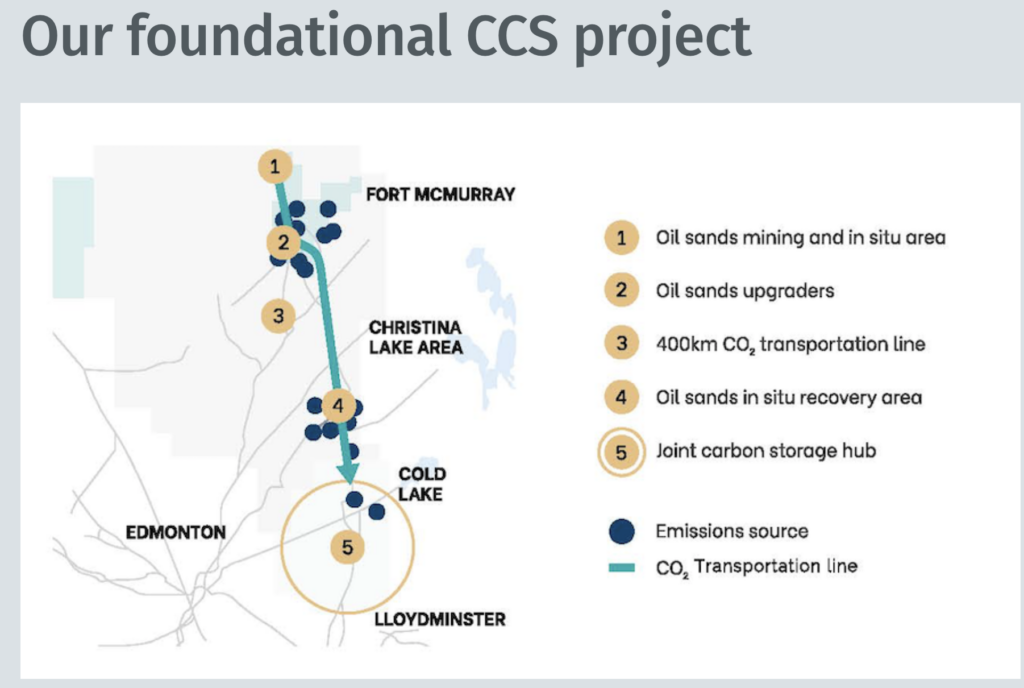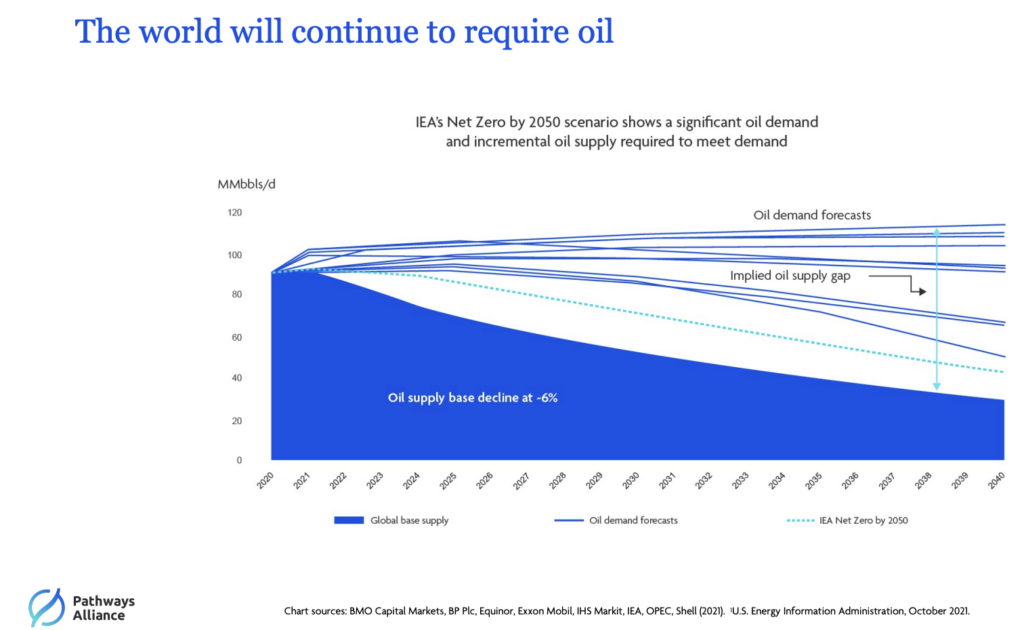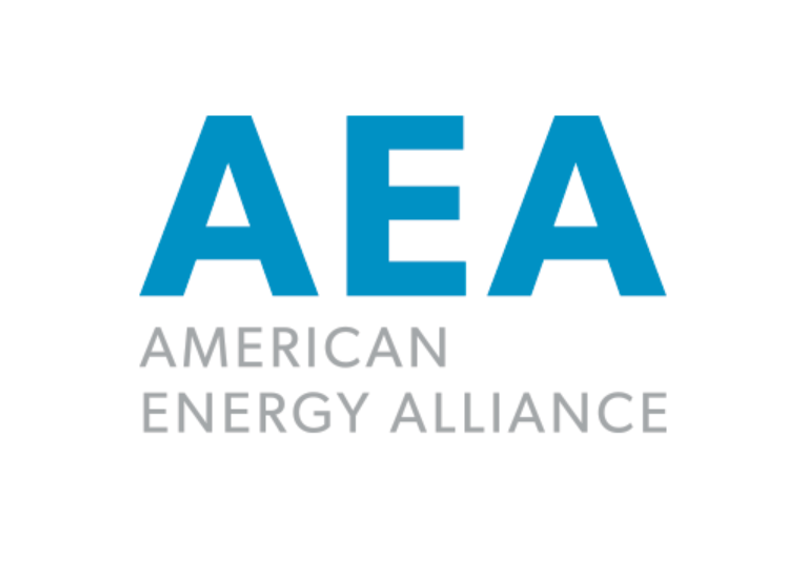Pathways Alliance
Background
The Pathways Alliance is an initiative of Canada’s six largest oil sands producers responsible for about 95% of Canada’s oil sands production including Canadian Natural, Cenovus Energy, ConocoPhillips Canada, Imperial, MEG Energy and Suncor Energy.1Jan Gorksi and Eyab El-Aini. “Waiting to Launch” (PDF), Pembina Institute, September 2022. Archivd .pdf on file at DeSmog. The Pathways Alliance was launched with the official goal of net-zero emissions from members’ operations by 2050. However, the net-zero goal refers exclusively to emissions associated with the extraction of fossil fuels, and not the majority of emissions that occur when the fuel is burned.2John Woodside. “The advertising blitz crafted to change your view of Big Oil,” Canada’ National Observer, July 20, 2023. Archived September 25, 2023. Archive URL: https://archive.ph/Tqjqt
The Pathways Alliance’s proposal is a “three-phased plan” including a carbon capture, utilization and storage (CCS) hub based near Cold Lake, Alberta, which would capture CO2 emissions from large tar sands operations and store it underground in geological formations.3“Our Plan,” Pathways Alliance. Archived July 3, 2022. Archived July 3, 2022. Archive URL: https://archive.ph/JxQck In its submission to the federal government, the Pathways Alliance revealed it planned to expand oil production as part of its net-zero goal.4Geoff Dembicki. “Going ‘Net-Zero’ Will Boost Oil Sands Production, Industry Tells Canadian Government,” DeSmog, March 6, 2023.
“In addition to CCS, we will continue to advance other existing and emerging technologies, such as direct air capture and switching to lower carbon fuels such as clean hydrogen and electricity to power oil sands operations,” an archive of the Pathways website claims.5“Our Plan,” Pathways Alliance. Archived July 3, 2022. Archived July 3, 2022. Archive URL: https://archive.ph/JxQck
While the Pathways Alliance advertises CCS as “safe, proven and reliable technology,”6“Our Plan,” Pathways Alliance. Archived July 3, 2022. Archived July 3, 2022. Archive URL: https://archive.ph/JxQck critics have noted CCS offers the oil industry a path to prolong fossil fuel use while relying heavily on public funding. For example, in internal documents, BP wrote CCS “could enable continued large-scale use of fossil fuels in a tightly carbon-limited world but faces substantial technology, commercial and logistical challenges.”7Dana Drugmand. “Big Oil’s Been Secretly Validating Critics’ Concerns about Carbon Capture,” DeSmog, February 13, 2023. Events like the CO2 pipeline rupture in Satartia, Mississipi, have also called into question the safety of carbon dioxide pipelines near communities.8Dan Zegart. “The Gassing Of Satartia,” Huffpost, August 26, 2021. Archived September 25, 2023. Archive URL: https://archive.ph/grKIt
According to the summary of a September 2022 report by the Pembina Institute, “Although Pathways has successfully generated interest and coverage among industry and industry-watchers (including government and media) about its ability to help meet Canada’s 2030 and 2050 emissions reduction targets, most details of its plans remain undisclosed, and since it was established there have been no significant decarbonization investment decisions made by its members.”9Jan Gorksi and Eyab El-Aini. “Waiting to Launch” (PDF), Pembina Institute, September 2022. Archivd .pdf on file at DeSmog.
As of May 2023, the Pathways Alliance was being investigated by Canada’s Competition Bureau on whether it had misled the public on its advertising campaign promoting net-zero emissions by 2050.10Rod Nickel. “Canada’s Competition Bureau investigates oil sands group over advertising,” Reuters, May 11, 2023. Archived September 25, 2023. Archive URL: https://archive.ph/2Jsjx
Pathways Alliance Members
The Oil Sands Pathways to Net Zero Alliance, Canada’s Oil Sands Innovation Alliance (COSIA), and the Oil Sands Community Alliance (OSCA) joined to become the Pathways Alliance on June 15, 2022.11(Press Release). “KEY OIL SANDS GROUPS JOIN FORCES UNDER PATHWAYS ALLIANCE BANNER,” COSIA with Pathways Alliance. Archived September 14, 2023. Archive URL: https://archive.ph/KCFHC COSIA continues to “operate as a division within the Pathways Alliance,” and their logo is now “COSIA with Pathways Alliance.”12(Press Release). “KEY OIL SANDS GROUPS JOIN FORCES UNDER PATHWAYS ALLIANCE BANNER,” COSIA with Pathways Alliance. Archived September 14, 2023. Archive URL: https://archive.ph/KCFHC
COSIA has also been introduced as “the innovation arm” of Pathways Alliance.13“Lake Miwasin,” YouTube video uploaded by user “Pathways Alliance,” June 6, 2023. Archived .mp4 on file at DeSmog.
There is significant overlap between the member companies of the three groups:
| Company | Canada’s Oil Sands Innovation Alliance (COSIA)14“Reimagining Energy for the Future: Annual Report 2019” (PDF), COSIA. Archived .pdf on file at DeSmog. – Formed in March 2012 | Oil Sands Community Alliance (OSCA)15(Press Release). “KEY OIL SANDS GROUPS JOIN FORCES UNDER PATHWAYS ALLIANCE BANNER,” COSIA with Pathways Alliance. Archived September 14, 2023. Archive URL: https://archive.ph/KCFHC – Formed October 2013 | Oil Sands Pathways to Net Zero Alliance16“Press Release: ConocoPhillips Canada joins Oil Sands Pathways to Net Zero alliance,” Oil Sands Pathways to Net Zero. Archived February 20, 2022. Archive URL: https://archive.ph/QceLD – Formed June 2021 | Pathways Alliance17“Our organization,” Pathways Alliance. Archived September 14, 2023. Archive URL: https://archive.ph/S6M8E – Formed June 2022 |
| BP | Y | |||
| Canadian Natural Resources | Y | Y | Y | Y |
| Cenovus | Y | Y | Y | Y |
| ConocoPhillips Canada | Y | Y | Y | Y |
| Husky | Y | |||
| Imperial Oil | Y | Y | Y | Y |
| MEG Energy | Y | Y | ||
| Suncor | Y | Y | Y | Y |
| Syncrude | Y | Y | ||
| Teck | Y |
Pathways Proposed Carbon Capture and Storage (CCS) Hub
The government of Alberta outlines Phase 1 of the Pathways Alliance’s proposed Carbon Capture and Storage hub with a destination terminal with an estimated cost of $16.5B and a schedule of 2025 – 2030.18“Pathways Alliance Carbon Capture Storage Hub (Phase 1),” Government of Alberta. Archived September 14, 2023. Archive URL: https://archive.ph/zg9x5 As of January 2023, the Pathways Alliance had not made a final investment decision on the CCS project, CBC reported.19Thompson Reuters. “Canada’s oilsands producers get Alberta government OK to evaluate proposed carbon storage site,” CBC News, January 5, 2023. Archived September 19, 2023. Archive URL: https://archive.ph/nTkiz
The project would see a carbon capture and storage network built bringing CO2 captured from over 20 tar sands facilities and transporting it through 400km of pipeline to be stored in an underground carbon storage hub near Cold Lake.
“The Pathways Alliance has partnered with CNRL, Cenovus Energy, ConocoPhilips, Imperial, MEG Energy, and Suncor among others,” the Government of Alberta’s project page notes.
According to an archived version of the Pathways Alliance website:20“Our Plan,” Pathways Alliance. Archived July 3, 2022. Archived July 3, 2022. Archive URL: https://archive.ph/JxQck
“There is no single path to net zero. That’s why we’re pursuing multiple technologies and approaches to achieve our goal of net zero emissions by 2050.
“A major component of our plan, and one we can implement the fastest, is carbon capture, utilization and storage (CCS) technology. CCS involves capturing CO2 emissions at the source, then transporting the CO2 to safe storage deep underground in geological formations. CCS is a safe, proven and reliable technology and Canada is a leader in using it.
“In addition to CCS, we will continue to advance other existing and emerging technologies, such as direct air capture and switching to lower carbon fuels such as clean hydrogen and electricity to power oil sands operations.
“Because of the amount of long-term capital investment required to build carbon capture and storage infrastructure, and the speed needed to meet 2030 targets, the countries that are doing this successfully are all using a collaborative model where governments are co-investing alongside industry. Also It also requires supportive fiscal/regulatory system.”

A CCS project of this size is a huge undertaking that requires significant up-front work and a strong partnership between industry and government to proceed,” Pathways president Kendall Dilling said in a press release announcing the proposed project.
“We continue to work with the federal and Alberta governments to ensure Canada’s co-funding programs and regulatory environment for CCS are globally competitive and that emissions reduction targets for our industry are realistic and achievable,” he added.
In early September 2023, Reuters reported the Pathways Alliance was struggling to get a key tool in place involving the proposed CCS hub. An Alberta government fund told the Pathways Alliance that the project was “too large and too risky for a contract for difference, a tool which would lock in future carbon credit prices,” Reuters reported.22Steve Scherer. “Exclusive: Canada oil sands carbon capture project struggles to get key contract,” Reuters, September 5, 2023. Archived September 25, 2023. Archive URL: https://archive.ph/nDdEE
The planned 400km pipeline would carry CO2 from more than 20 oil sands facilities in Alberta. “The pipeline wouldn’t be done until the 2028 timeframe at the earliest, and then you would tie in the northern oil sands sites once the pipeline is in place,” Pathways Alliance president Kendall Dilling told EnergyNow. 23Deborah Jaremko. “Inside the Pathways Alliance, Canada’s oil Sands pledge to Reach Net Zero by 2050,” EnergyNow Media, November 21, 2022. Archived September 25, 2023. Archive URL: https://archive.ph/kqZvS
Stance on Climate Change
January 30, 2023
“Climate change is a critical challenge and as one of our country’s largest CO2 emitters, our industry has an important role to play in helping meet the national commitment of net-zero emissions by 2050,” Pathways Alliance president Kendall Dilling claimed in a Q&A with the International CCS Knowledge Centre,24“Q&A with Kendall Dilling of Pathways Alliance,” International CCS Knowledge Centre, January 30, 2023. Archived September 20, 2023. Archive URL: https://archive.ph/3rpQj an initiative of BHP and SaskPower.25“FOUNDERS,” International CCS Knowledge Centre. Archived September 20, 2023. Archive URL: https://archive.ph/UpIKC
October 24, 2022
“We need to keep in mind that this is about reducing emissions and not reducing production,” the Pathways Alliance noted in a submission to the House of Commons Standing Committee on Environment and Sustainable Development. The document’s metadata lists its creation date as October 24, 2022,26“A Brief on Clean Technology in Canada: Submitted to the House of Commons Standing Committee on Environment and Sustainable Development” (PDF), Pathways Alliance, October 24, 2022 (document creation date). Archived .pdf on file at DeSmog. Retrieved from influencemap.org. The Standing Committee met on October 25 to discuss matters including “its study of clean technologies in Canada.”27MINUTES OF PROCEEDINGS: Standing Committee on Environment and Sustainable Development (ENVI): 44th Parliament, 1st Session: Meeting 32, House of Commons Canada. Archived September 19, 2023. Archive URL: https://archive.ph/adFha
October 17, 2022
According to an archived Pathways Alliance slide deck, “The world will continue to require oil“:28“The Pathways Alliance Vision” (PDF), Pathways Alliance, October 17, 2022. Archived .pdf on file at DeSmog.

The presentation goes on to suggest that “Canadian oil should be preferred barrel globally,” given higher ESG scores.29“The Pathways Alliance Vision” (PDF), Pathways Alliance, October 17, 2022. Archived .pdf on file at DeSmog.
Funding
According to the Pathways Alliance website, “With anticipated co-funding from governments, our member companies plan to invest $24.1 billion by 2030.”30“Net Zero Initiative,” Pathways Alliance. Archived September 28, 2023. Archive URL: https://archive.ph/NdhO6
Key People
Pathways Leadership
Kendall Dilling — President
Kendall Dilling was previously the vice-president for environment & regulatory at Cenovus. According to his profile at CERAWeek, he sits on several committees at the Canadian Association of Petroleum Producers (CAPP) and serves on the boards of the Canadian Energy Research Institute and the Alberta Orphan Well Association.31“Kendall Dilling,” CERAWeek. Archived September 20, 2023. Archive URL: https://archive.ph/zzUrZ A search of the lobbyist registry with the Office of the Commissioner of Lobbying of Canada shows that Dilling worked as a lobbyist for CAPP from 2008 to 2010 where he had the title of Manager, Oil Sands Environment and Regulatory.32“Registration – in-house Organization: Canadian Association of Petroleum Producers“, LobbyCanada.Gc.Ca. Archived data on file at DeSmog. Accessed September 2023.
Dilling is listed as a director of Nexera Energy, and previously worked with TransCanada Pipelines where he “oversaw the regulatory approval process for numerous pipeline projects in Canada and the United States.”33“COMPANY,” Nexera. Archived September 20, 2023. Archive URL: https://archive.ph/cBfbM
Dilling has been on the board of directors of a variety of other companies in the oil and gas sector including Emerald Bay Energy. He has also worked with EnCana Corporation and ConocoPhillips Canada, and previously a director of regulatory and HSE at Ivanhoe Energy. “During his time with Ivanhoe, Mr. Dilling has been partially seconded to the Canadian Association of Petroleum Producers where he fulfills the role of Manager, Oil Sands Environment and Regulatory,” a 2010 press release noted.34(Press Release). “Emerald Bay announces change to Board of Directors,” Emerald Bay Energy Inc. via Cision, March 2, 2010. Archived September 20, 2023. Archive URL: https://archive.ph/NeSnG
He has also been listed as a director or officer of BWI Holdings.35FORM 8-K for BWI HOLDINGS, INC., SEC.gov, December 30, 2010.
Mark Cameron — Vice President, External Relations
Mark Cameron has been previously listed as a member of the advisory board of the Munk Debates, an initiative of the Aurea Foundation, a foundation founded by Peter and Melanie Munk that has supported a variety of conservative causes in Canada.36“About,” Munk Debates. Archived October 16, 2011. Archive URL: https://archive.ph/2iLkC
According to his profile at the Pathways Alliance, Cameron has held board or advisory roles with the Canadian-American Business Council, Canada-India Business Council, the Munk Debates, Canada 2020, Smart Prosperity, the Energy Futures Lab, Public Policy Forum and the Banff Forum.37“Leadership,” Pathways Alliance. Archived September 20, 2023. Archive URL: https://archive.ph/CcsAb
Mark Cameron’s LinkedIn account shows he previously worked as deputy minister at the policy coordination office of the executive council for the Government of Alberta under then-premier Jason Kenney.38“Mark Cameron,” LinkedIn. Accessed September 2023. Archived .pdf on file at DeSmog. Prior to joining government he worked as the executive director of Canadians for Clean Prosperity, a group that advocates for “market-based solutions to reduce greenhouse gas emissions, foster inclusive economic growth and competitiveness, and catalyze global climate action.”39“About Us,” Clean Prosperity. Archived September 25, 2023. Archive URL: https://archive.ph/tsGBz Canadians for Clean Prosperity advocates for carbon pricing, and direct air capture of CO2 among its policy recommendations.40“Policy Recommendations,” Clean Prosperity. Archived September 25, 2023. Archive URL: https://archive.ph/6VzLc
Prior to that, Cameron worked for Hill+Knowlton Strategies as their senior vice president and deputy energy practice leader where he “Provided strategic advice to clients in the energy sector on a variety of environmental, regulatory, and stakeholder relations issue[s].”41“Mark Cameron,” LinkedIn. Accessed September 2023. Archived .pdf on file at DeSmog.
From 2009 to 2011 he worked as director of corporate affairs for Ontario Power Generation. From 2006 to 2009 he worked as a senior policy advisor and director of policy and research under Prime Minister Stephen Harper.42“Mark Cameron,” LinkedIn. Accessed September 2023. Archived .pdf on file at DeSmog.
Wes Jickling — Vice President, Technology Development & COSIA
Wes Jickling continued to work as the vice president for technology development at COSIA after COSIA became a division within the Pathways Alliance.43(Press Release). “KEY OIL SANDS GROUPS JOIN FORCES UNDER PATHWAYS ALLIANCE BANNER,” COSIA with Pathways Alliance. Archived September 14, 2023. Archive URL: https://archive.ph/KCFHC According to his LinkedIn account, Jickling worked as the deputy minister of intergovernmental affairs at the Government of Saskatchewan before joining COSIA, and has held a variety of other roles with government and private companies.44“Wes Jickling,” LinkedIn. Accessed September 2023. Archived .pdf on file at DeSmog.
Brenda Leeds Binder — Vice President, Legal
According to her profile with the Pathways Alliance, Brenda Leeds Binder came from Suncor to assume a role as the leader of the “Pathways Transition Team.” She also served on the board and shareholders steering committee for COSIA.
Her 11 year career with Suncor, according to her LinkedIn account, included a variety of roles including the director of governance and integration for the Oil Sands Alliance where she worked to “coordinate the integration of Suncor’s efforts relating to the Oil Sands Pathways to Net Zero initiative and participate as Suncor’s representative at the Canada’s Oil Sands Innovation Alliance.” Prior to her engagement with the Alliance, she worked as the director for external oil sands innovation through COSIA, and before that as a director of legal affairs for intellectual property.45“Brenda Leeds Binder, K.C.” LinkedIn. Accessed September 2023. Archived .pdf on file at DeSmog.
Actions
September 17–21, 2023
The Pathways Alliance was among sponsors of the 24th World Petroleum Congress, a conference that took place in Calgary, Alberta. Other sponsors included the Kingdom of Saudi Arabia and the Canadian Association of Petroleum Producers.46Taylor Noakes. “Oil and Gas Leaders to Make ‘Net Zero’ Pitch at World Petroleum Congress,” DeSmog, August 3, 2023.
Kendall Dilling, speaking at the conference, suggested that the Pathways Alliance’s CCS project would not be subject to federal oversight: “Our project happens to be entirely provincially regulated, which gives us a much more streamlined regulatory process,” he said. “If this had to go through a federal impact assessment process, you’re adding probably several more years on top of that.”47Taylor Noakes. 48“One Billion People Will Die Without Oil Production, Kuwait Official Claims,” DeSmog, September 22, 2023.
September 12, 2023
Speaking outside the Carbon Capture Canada conference in Edmonton, Cold Lake First Nations Chief Kelsey Jacko alleged that the Pathways Alliance had failed to consult local Indigenous communities on the carbon capture project proposed for his region.49Taylor Noakes. “Oil Lobby’s Carbon Capture Solution Hasn’t Consulted Local Nation, Chief Says,” DeSmog, September 15, 2023.
“They’re ramming it down our throats,” said Chief Jacko during a media gathering outside of the conference.50Taylor Noakes. “Oil Lobby’s Carbon Capture Solution Hasn’t Consulted Local Nation, Chief Says,” DeSmog, September 15, 2023.
“We’re asking questions and they’re not being answered,” he later added.51Taylor Noakes. “Oil Lobby’s Carbon Capture Solution Hasn’t Consulted Local Nation, Chief Says,” DeSmog, September 15, 2023.
Heather Bishop, economic development director for Cold Lake First Nations, said her community has attempted to initiate discussions to get a better idea of what the project entails. “We don’t know the full delineation of the project at this time. We received an initial consultation package very recently, just last week. They reached out, but no detailed information until last week.”52Taylor Noakes. “Oil Lobby’s Carbon Capture Solution Hasn’t Consulted Local Nation, Chief Says,” DeSmog, September 15, 2023.
Bishop mentioned safety concerns about the project: “There aren’t a lot of projects across the world to rely on, to say this is safe. The geology is different everywhere. Who’s to say that it’s safe in any given area? The scale of this project, I think, is what’s intimidating for our nations right now.
September 5, 2023
Pathways Alliance president Kendall Dilling wrote in The Calgary Herald promoting CCS as “an essential solution to the climate challenge” and suggesting the Pathways project “has the potential to define the decade for Alberta’s oilsands industry” while advocating for government funding and support:53Kendall Dilling. “Opinion: Defining the decade and beyond for Canada’s oilsands,” Calgary Herald, September 5, 2023. Archived September 25, 2023. Archive URL: https://archive.ph/sZEMQ
“To get this project off the ground, close collaboration between industry and governments is vital,” Dilling wrote. “Canada needs to establish appropriate policy that will incentivize the development and deployment of all manners of clean technology, including CCS.”54Kendall Dilling. “Opinion: Defining the decade and beyond for Canada’s oilsands,” Calgary Herald, September 5, 2023. Archived September 25, 2023. Archive URL: https://archive.ph/sZEMQ
“Successful CCS projects in other countries are receiving significant government support,” he added, pointing to Norway as an example.55Kendall Dilling. “Opinion: Defining the decade and beyond for Canada’s oilsands,” Calgary Herald, September 5, 2023. Archived September 25, 2023. Archive URL: https://archive.ph/sZEMQ
April 2023
DeSmog analysis found that the Pathways Alliance had paid to link its website to hundreds of Google search terms related to climate change in the prior three months.56Geoff Dembicki. “Oil Sands Companies Are ‘Distorting Public Information’ on Google, Expert Says,” DeSmog, April 5, 2023.
“In early January, for example, Canadians who searched ‘how we can stop climate change’ on Google would be directed to a Pathways Alliance site claiming oil sands producers are prepared to spend $24.1 billion by 2030 “on an ambitious, actionable plan to reduce greenhouse gas (GHG) emissions,” Geoff Dembicki reported.57Geoff Dembicki. “Oil Sands Companies Are ‘Distorting Public Information’ on Google, Expert Says,” DeSmog, April 5, 2023.
April 24, 2023
When a new study was released suggesting the tar sands could be underreporting their greenhouse gas emissions, the Pathways Alliance released a statement criticizing the study’s methodology.58Mark Cameron. “Statement on newly released CO2 emissions study,” Pathways Alliance, April 24, 2023. Archived June 2, 2023. Archive URL: https://archive.ph/5r3qn
“Our scientists and technical experts reviewed this study and while we think the use of technology could have some potential for some applications, inherent weaknesses in the research methods diminish our confidence in the findings,” Mark Cameron, Pathways’ vice president for external relations, said in the statement.59Mark Cameron. “Statement on newly released CO2 emissions study,” Pathways Alliance, April 24, 2023. Archived June 2, 2023. Archive URL: https://archive.ph/5r3qn
March 16, 2023
Greenpeace Canada filed a complaint with the Competition Bureau regarding an alleged false advertising campaign. The complaint specified the Pathways Alliance’s “Let’s clear the air” ad campaign that appeared in a variety of media including newspapers, billboards, social media, and podcasts.60Marco Chown Oved. “Oilsands companies’ ‘false’ net zero ads spur complaint to Competition Bureau,” Toronto Star, March 16 2023. Archived September 19, 2023. Archive URL: https://archive.ph/z1V2X
“If the Pathways Alliance wants to ‘clear the air,’ let’s start by clarifying what their ad campaign really is: greenwashing,” Priyanka Vittal, legal counsel for Greenpeace Canada, said in a press release. “The Pathways Alliance’s members continue to expand fossil fuel production, their net-zero plan doesn’t even consider all emissions — and it still doesn’t add up to zero.”61Adeoluwa Atayero. “‘Let’s clear the air’: Greenpeace Canada launches complaint against oil sands alliance for misleading advertising campaign,” Greenpeace, March 16, 2023. Archived September 19, 2023. Archive URL: https://archive.ph/gukq2
The full complaint alleges the claims made by the Pathways Alliance that they are “making clear strides toward net zero” and that they will “help our country achieve a sustainable future” are “false and misleading” for the following reasons:62“Application for Inquiry into false and misleading representations made by the Pathways Alliance about their climate action and the climate impact of their business” (PDF), Greenpeace, March 16, 2023 (PDF Creation date). Archived .pdf on file at DeSmog.
- “They fail to incorporate the lifecycle of the product
- “They represent that they have and are following a transparent and concrete plan for reducing
emissions and/or achieving net zero while they are continuing to expand production - “They are based on untenable and not established assumptions about future technologies, and
- “They give the impression that the Pathways Alliance is a climate leader and that their actions
will clear pollution when they are not taking actions that do so.”
February 2023
InfluenceMap released a report on Canadian oil and gas producers that, among other items, highlighted “the emerging role of the Pathways Alliance and its ‘Oil Sands Pathways to Net Zero’ initiative.”63“The Canadian Oil and Gas Industry and Climate Policy,” InfluenceMap, February 2023. Archived September 20, 2023. Archive URL: https://archive.ph/lfTXK
“The Pathways Alliance advocacy appears to emphasize the sector’s commitments to reducing GHG emissions from oil sands production operations, framing this as part of net zero strategy. At the same time, the initiative promotes the overall role of Canadian oil in the global energy mix, whilst advocating against regulation to drive down the sector’s emission in the nearer term,” the report noted.
InfluenceMap analyst Sofia Basheer later commented to DeSmog, “Every time they’re talking about decarbonization, there’s a push behind that to increase the oil and gas supply,” adding, “It’s incompatible with Canada’s climate goals.”64Geoff Dembicki. “Going ‘Net-Zero’ Will Boost Oil Sands Production, Industry Tells Canadian Government,” DeSmog, March 6, 2023.
November 29, 2022
Resource Works organized an event featuring a “conversation on the path to net zero” sponsored by the Pathways Alliance and Foresight Canada.65“LUNCH: Energy leaders in conversation on the path to net zero,” Evenbrite. Archived November 24, 2022. Archive URL: https://archive.ph/o9h8C
Speakers listed include Mark Cameron, vice-president of external relations with the Pathways Alliance, Amee Barber of General Fusion, and Matthew Klippenstein of the Canadian Hydrogen & Fuel Cell Association.66“LUNCH: Energy leaders in conversation on the path to net zero,” Evenbrite. Archived November 24, 2022. Archive URL: https://archive.ph/o9h8C
November 2022
DeSmog reported that Pathways Alliance member company Suncor had waved off pressure to decarbonize in its 2022 submission to the Carbon Disclosure Project (CDP), admitting that “Planned growth projects to meet global energy demand may increase Suncor’s absolute emissions in the next decade.”67Geoff Dembicki. “Canadian Oil Companies ‘Lying’ About Their Net-Zero Targets, Says COP27 Delegate,” DeSmog, November 16, 2022.
“Notwithstanding the efforts of those few to divest from oil & gas, some new investors have entered oil and gas positions and some remaining investors have been willing to increase their investment in oil and gas, so the net impact on Suncor is negligible at this time,” it says.68Geoff Dembicki. “Canadian Oil Companies ‘Lying’ About Their Net-Zero Targets, Says COP27 Delegate,” DeSmog, November 16, 2022.
Suncor’s admission contrasted with the advertisements made by the Pathways Alliance suggesting Canada’s tar sands would be “Net Zero by 2050.”69Geoff Dembicki. “Canadian Oil Companies ‘Lying’ About Their Net-Zero Targets, Says COP27 Delegate,” DeSmog, November 16, 2022.
October 2022
The Pathways Alliance made a submission to the House of Commons Standing Committee of Finance as part of its pre-budget consultations where Pathways suggested “As our sector decarbonizes, we believe that the oil sands can play an even bigger role in producing energy for Canada and the world.”70“PATHWAYS ALLIANCE SUBMISSION TO THE 2023 FEDERAL BUDGET CONSULTATION PROCESS” (PDF), Pathways Alliance, October 2022. Retrieved from InfluenceMap.org.
The submissions suggests: “If Canadian oilsands can reduce its carbon intensity below other global sources of oil, we believe Canada should seek to increase its market share for responsibly produced, lower emissions energy, even if global market demand, as a whole, begins to decline.”71“PATHWAYS ALLIANCE SUBMISSION TO THE 2023 FEDERAL BUDGET CONSULTATION PROCESS” (PDF), Pathways Alliance, October 2022. Retrieved from InfluenceMap.org.
September 23, 2022
The nonpartisan Pembina Institute released a report suggesting that over a year and a half after the Pathways Alliance had announced its net-zero emissions strategy, “most details of its plans remain undisclosed, and since it was established there have been no significant decarbonization investment decisions made by its members.”72“Waiting to Launch: The gap between Canadian oilsands companies’ climate pledges and actions” (PDF), Pembina Institute, September 2022.
The report summarized:
“Canadian oil and gas companies’ free cashflow is estimated to reach $152 billion in 2022. This is
the highest level of profits the industry has ever seen. However, for the first time, this boom is
not being accompanied by new projects in Alberta’s oilsands sector, or a significant expansion of
jobs. It is also not being invested in decarbonization efforts to align with the Pathways pledges.
Instead, companies are prioritizing short-term shareholder value in the form of share repurchases and dividend payments. Companies across Canada’s energy sector now have historically low levels of capital expenditure as a percentage of their free cashflow.”
The Pembina Institute also released a November 2022 update noting that “despite some announcements in recent weeks from] Pathways on the ‘advancement’ of their emissions reduction plans, it remains the case that most details of these plans — including project specifics, timelines for projects, capital allocations, or timelines for final investment decisions — remain undisclosed.”73“Waiting to Launch: Third Quarter 2022 Update,” Pembina Institute, November 2022. Archived .pdf on file at DeSmog.
Related Organizations
The Oil Sands Pathways to Net Zero Alliance, Canada’s Oil Sands Innovation Alliance (COSIA), and the Oil Sands Community Alliance (OSCA) joined to become the Pathways Alliance on June 15, 2022.74(Press Release). “KEY OIL SANDS GROUPS JOIN FORCES UNDER PATHWAYS ALLIANCE BANNER,” COSIA with Pathways Alliance. Archived September 14, 2023. Archive URL: https://archive.ph/KCFHC 75(Press Release). “KEY OIL SANDS GROUPS JOIN FORCES UNDER PATHWAYS ALLIANCE BANNER,” COSIA with Pathways Alliance. Archived September 14, 2023. Archive URL: https://archive.ph/KCFHC
- Oil Sands Pathways to Net Zero Alliance — Launched in 202176“Press Release: ConocoPhillips Canada joins Oil Sands Pathways to Net Zero alliance,” Oil Sands Pathways to Net Zero. Archived February 20, 2022. Archive URL: https://archive.ph/QceLD
- Canadian Natural Resources
- Cenovus Energy
- ConocoPhillips Canada
- Imperial Oil
- MEG Energy
- Suncor
- Canada’s Oil Sands Innovation Alliance (COSIA) — Launched in 201277“Reimagining Energy for the Future: Annual Report 2019” (PDF), COSIA. Archived .pdf on file at DeSmog.
- BP
- Canadian Natural Resources
- Cenovus
- ConocoPhillips Canada
- Husky
- Imperial Oil
- Suncor
- Syncrude
- Teck
- Oil Sands Community Alliance (OSCA) — Launched in 201378“Our Member Companies,” Oil Sands Community Alliance. Archived June 17, 2021. Archive URL: https://archive.ph/mJWXl
- Imperial Oil
- ConocoPhillips Canada
- Syncrude
- Canadian Natural Resources
- Suncor
- Cenovus
Contact & Address
The Pathways Alliance website listed the following address as of September 2023:79“Our organization,” Pathways Alliance. Archived September 14, 2023. Archive URL: https://archive.ph/S6M8E
Bow Valley Square 3
255 Fifth Ave. S.W.
Suite 2000
Calgary, AB T2P 3G6
Social Media
- PathwaysAlliance on Facebook
- @PathwaysNetZero on X
- Pathways Alliance on LinkedIn
- @pathwaysalliance on Instagram
Other Resources
- Lloyd Alter. “Net-Zero Efforts of Canadian Oil Sands Companies Are Greenwashing,” Treehugger, June 14, 2021.
- Carl Meyer. “Are Canadian oilsands companies working to save the planet or save face?” The Narwhal, February 14, 2023.
- “The Canadian Oil and Gas Industry and Climate Policy,” InfluenceMap, February 2023.
- Taylor Noakes. “Montreal Bike Share Pulls Pathways Alliance Ads Amid Greenwashing Controversy,” DeSmog, August 28, 2023.
- Taylor Noakes. “Oil Lobby Claims More Production Won’t Raise Emissions, But Ignores Crucial Data,” DeSmog, September 21, 2023.
- “Oil sands industry groups combine as Pathways Alliance,” Oil & Gas Journal, June 16, 2022.
Resources
- 1Jan Gorksi and Eyab El-Aini. “Waiting to Launch” (PDF), Pembina Institute, September 2022. Archivd .pdf on file at DeSmog.
- 2John Woodside. “The advertising blitz crafted to change your view of Big Oil,” Canada’ National Observer, July 20, 2023. Archived September 25, 2023. Archive URL: https://archive.ph/Tqjqt
- 3“Our Plan,” Pathways Alliance. Archived July 3, 2022. Archived July 3, 2022. Archive URL: https://archive.ph/JxQck
- 4Geoff Dembicki. “Going ‘Net-Zero’ Will Boost Oil Sands Production, Industry Tells Canadian Government,” DeSmog, March 6, 2023.
- 5“Our Plan,” Pathways Alliance. Archived July 3, 2022. Archived July 3, 2022. Archive URL: https://archive.ph/JxQck
- 6“Our Plan,” Pathways Alliance. Archived July 3, 2022. Archived July 3, 2022. Archive URL: https://archive.ph/JxQck
- 7Dana Drugmand. “Big Oil’s Been Secretly Validating Critics’ Concerns about Carbon Capture,” DeSmog, February 13, 2023.
- 8Dan Zegart. “The Gassing Of Satartia,” Huffpost, August 26, 2021. Archived September 25, 2023. Archive URL: https://archive.ph/grKIt
- 9Jan Gorksi and Eyab El-Aini. “Waiting to Launch” (PDF), Pembina Institute, September 2022. Archivd .pdf on file at DeSmog.
- 10Rod Nickel. “Canada’s Competition Bureau investigates oil sands group over advertising,” Reuters, May 11, 2023. Archived September 25, 2023. Archive URL: https://archive.ph/2Jsjx
- 11(Press Release). “KEY OIL SANDS GROUPS JOIN FORCES UNDER PATHWAYS ALLIANCE BANNER,” COSIA with Pathways Alliance. Archived September 14, 2023. Archive URL: https://archive.ph/KCFHC
- 12(Press Release). “KEY OIL SANDS GROUPS JOIN FORCES UNDER PATHWAYS ALLIANCE BANNER,” COSIA with Pathways Alliance. Archived September 14, 2023. Archive URL: https://archive.ph/KCFHC
- 13“Lake Miwasin,” YouTube video uploaded by user “Pathways Alliance,” June 6, 2023. Archived .mp4 on file at DeSmog.
- 14“Reimagining Energy for the Future: Annual Report 2019” (PDF), COSIA. Archived .pdf on file at DeSmog.
- 15(Press Release). “KEY OIL SANDS GROUPS JOIN FORCES UNDER PATHWAYS ALLIANCE BANNER,” COSIA with Pathways Alliance. Archived September 14, 2023. Archive URL: https://archive.ph/KCFHC
- 16“Press Release: ConocoPhillips Canada joins Oil Sands Pathways to Net Zero alliance,” Oil Sands Pathways to Net Zero. Archived February 20, 2022. Archive URL: https://archive.ph/QceLD
- 17“Our organization,” Pathways Alliance. Archived September 14, 2023. Archive URL: https://archive.ph/S6M8E
- 18“Pathways Alliance Carbon Capture Storage Hub (Phase 1),” Government of Alberta. Archived September 14, 2023. Archive URL: https://archive.ph/zg9x5
- 19Thompson Reuters. “Canada’s oilsands producers get Alberta government OK to evaluate proposed carbon storage site,” CBC News, January 5, 2023. Archived September 19, 2023. Archive URL: https://archive.ph/nTkiz
- 20“Our Plan,” Pathways Alliance. Archived July 3, 2022. Archived July 3, 2022. Archive URL: https://archive.ph/JxQck
- 21“Our Plan,” Pathways Alliance. Archived July 3, 2022. Archived July 3, 2022. Archive URL: https://archive.ph/JxQck
- 22Steve Scherer. “Exclusive: Canada oil sands carbon capture project struggles to get key contract,” Reuters, September 5, 2023. Archived September 25, 2023. Archive URL: https://archive.ph/nDdEE
- 23Deborah Jaremko. “Inside the Pathways Alliance, Canada’s oil Sands pledge to Reach Net Zero by 2050,” EnergyNow Media, November 21, 2022. Archived September 25, 2023. Archive URL: https://archive.ph/kqZvS
- 24“Q&A with Kendall Dilling of Pathways Alliance,” International CCS Knowledge Centre, January 30, 2023. Archived September 20, 2023. Archive URL: https://archive.ph/3rpQj
- 25“FOUNDERS,” International CCS Knowledge Centre. Archived September 20, 2023. Archive URL: https://archive.ph/UpIKC
- 26“A Brief on Clean Technology in Canada: Submitted to the House of Commons Standing Committee on Environment and Sustainable Development” (PDF), Pathways Alliance, October 24, 2022 (document creation date). Archived .pdf on file at DeSmog. Retrieved from influencemap.org.
- 27
- 28“The Pathways Alliance Vision” (PDF), Pathways Alliance, October 17, 2022. Archived .pdf on file at DeSmog.
- 29“The Pathways Alliance Vision” (PDF), Pathways Alliance, October 17, 2022. Archived .pdf on file at DeSmog.
- 30“Net Zero Initiative,” Pathways Alliance. Archived September 28, 2023. Archive URL: https://archive.ph/NdhO6
- 31“Kendall Dilling,” CERAWeek. Archived September 20, 2023. Archive URL: https://archive.ph/zzUrZ
- 32“Registration – in-house Organization: Canadian Association of Petroleum Producers“, LobbyCanada.Gc.Ca. Archived data on file at DeSmog. Accessed September 2023.
- 33“COMPANY,” Nexera. Archived September 20, 2023. Archive URL: https://archive.ph/cBfbM
- 34(Press Release). “Emerald Bay announces change to Board of Directors,” Emerald Bay Energy Inc. via Cision, March 2, 2010. Archived September 20, 2023. Archive URL: https://archive.ph/NeSnG
- 35FORM 8-K for BWI HOLDINGS, INC., SEC.gov, December 30, 2010.
- 36“About,” Munk Debates. Archived October 16, 2011. Archive URL: https://archive.ph/2iLkC
- 37“Leadership,” Pathways Alliance. Archived September 20, 2023. Archive URL: https://archive.ph/CcsAb
- 38“Mark Cameron,” LinkedIn. Accessed September 2023. Archived .pdf on file at DeSmog.
- 39“About Us,” Clean Prosperity. Archived September 25, 2023. Archive URL: https://archive.ph/tsGBz
- 40“Policy Recommendations,” Clean Prosperity. Archived September 25, 2023. Archive URL: https://archive.ph/6VzLc
- 41“Mark Cameron,” LinkedIn. Accessed September 2023. Archived .pdf on file at DeSmog.
- 42“Mark Cameron,” LinkedIn. Accessed September 2023. Archived .pdf on file at DeSmog.
- 43(Press Release). “KEY OIL SANDS GROUPS JOIN FORCES UNDER PATHWAYS ALLIANCE BANNER,” COSIA with Pathways Alliance. Archived September 14, 2023. Archive URL: https://archive.ph/KCFHC
- 44“Wes Jickling,” LinkedIn. Accessed September 2023. Archived .pdf on file at DeSmog.
- 45“Brenda Leeds Binder, K.C.” LinkedIn. Accessed September 2023. Archived .pdf on file at DeSmog.
- 46Taylor Noakes. “Oil and Gas Leaders to Make ‘Net Zero’ Pitch at World Petroleum Congress,” DeSmog, August 3, 2023.
- 47Taylor Noakes.
- 48“One Billion People Will Die Without Oil Production, Kuwait Official Claims,” DeSmog, September 22, 2023.
- 49Taylor Noakes. “Oil Lobby’s Carbon Capture Solution Hasn’t Consulted Local Nation, Chief Says,” DeSmog, September 15, 2023.
- 50Taylor Noakes. “Oil Lobby’s Carbon Capture Solution Hasn’t Consulted Local Nation, Chief Says,” DeSmog, September 15, 2023.
- 51Taylor Noakes. “Oil Lobby’s Carbon Capture Solution Hasn’t Consulted Local Nation, Chief Says,” DeSmog, September 15, 2023.
- 52Taylor Noakes. “Oil Lobby’s Carbon Capture Solution Hasn’t Consulted Local Nation, Chief Says,” DeSmog, September 15, 2023.
- 53Kendall Dilling. “Opinion: Defining the decade and beyond for Canada’s oilsands,” Calgary Herald, September 5, 2023. Archived September 25, 2023. Archive URL: https://archive.ph/sZEMQ
- 54Kendall Dilling. “Opinion: Defining the decade and beyond for Canada’s oilsands,” Calgary Herald, September 5, 2023. Archived September 25, 2023. Archive URL: https://archive.ph/sZEMQ
- 55Kendall Dilling. “Opinion: Defining the decade and beyond for Canada’s oilsands,” Calgary Herald, September 5, 2023. Archived September 25, 2023. Archive URL: https://archive.ph/sZEMQ
- 56Geoff Dembicki. “Oil Sands Companies Are ‘Distorting Public Information’ on Google, Expert Says,” DeSmog, April 5, 2023.
- 57Geoff Dembicki. “Oil Sands Companies Are ‘Distorting Public Information’ on Google, Expert Says,” DeSmog, April 5, 2023.
- 58Mark Cameron. “Statement on newly released CO2 emissions study,” Pathways Alliance, April 24, 2023. Archived June 2, 2023. Archive URL: https://archive.ph/5r3qn
- 59Mark Cameron. “Statement on newly released CO2 emissions study,” Pathways Alliance, April 24, 2023. Archived June 2, 2023. Archive URL: https://archive.ph/5r3qn
- 60Marco Chown Oved. “Oilsands companies’ ‘false’ net zero ads spur complaint to Competition Bureau,” Toronto Star, March 16 2023. Archived September 19, 2023. Archive URL: https://archive.ph/z1V2X
- 61Adeoluwa Atayero. “‘Let’s clear the air’: Greenpeace Canada launches complaint against oil sands alliance for misleading advertising campaign,” Greenpeace, March 16, 2023. Archived September 19, 2023. Archive URL: https://archive.ph/gukq2
- 62“Application for Inquiry into false and misleading representations made by the Pathways Alliance about their climate action and the climate impact of their business” (PDF), Greenpeace, March 16, 2023 (PDF Creation date). Archived .pdf on file at DeSmog.
- 63“The Canadian Oil and Gas Industry and Climate Policy,” InfluenceMap, February 2023. Archived September 20, 2023. Archive URL: https://archive.ph/lfTXK
- 64Geoff Dembicki. “Going ‘Net-Zero’ Will Boost Oil Sands Production, Industry Tells Canadian Government,” DeSmog, March 6, 2023.
- 65“LUNCH: Energy leaders in conversation on the path to net zero,” Evenbrite. Archived November 24, 2022. Archive URL: https://archive.ph/o9h8C
- 66“LUNCH: Energy leaders in conversation on the path to net zero,” Evenbrite. Archived November 24, 2022. Archive URL: https://archive.ph/o9h8C
- 67Geoff Dembicki. “Canadian Oil Companies ‘Lying’ About Their Net-Zero Targets, Says COP27 Delegate,” DeSmog, November 16, 2022.
- 68Geoff Dembicki. “Canadian Oil Companies ‘Lying’ About Their Net-Zero Targets, Says COP27 Delegate,” DeSmog, November 16, 2022.
- 69Geoff Dembicki. “Canadian Oil Companies ‘Lying’ About Their Net-Zero Targets, Says COP27 Delegate,” DeSmog, November 16, 2022.
- 70“PATHWAYS ALLIANCE SUBMISSION TO THE 2023 FEDERAL BUDGET CONSULTATION PROCESS” (PDF), Pathways Alliance, October 2022. Retrieved from InfluenceMap.org.
- 71“PATHWAYS ALLIANCE SUBMISSION TO THE 2023 FEDERAL BUDGET CONSULTATION PROCESS” (PDF), Pathways Alliance, October 2022. Retrieved from InfluenceMap.org.
- 72“Waiting to Launch: The gap between Canadian oilsands companies’ climate pledges and actions” (PDF), Pembina Institute, September 2022.
- 73“Waiting to Launch: Third Quarter 2022 Update,” Pembina Institute, November 2022. Archived .pdf on file at DeSmog.
- 74(Press Release). “KEY OIL SANDS GROUPS JOIN FORCES UNDER PATHWAYS ALLIANCE BANNER,” COSIA with Pathways Alliance. Archived September 14, 2023. Archive URL: https://archive.ph/KCFHC
- 75(Press Release). “KEY OIL SANDS GROUPS JOIN FORCES UNDER PATHWAYS ALLIANCE BANNER,” COSIA with Pathways Alliance. Archived September 14, 2023. Archive URL: https://archive.ph/KCFHC
- 76“Press Release: ConocoPhillips Canada joins Oil Sands Pathways to Net Zero alliance,” Oil Sands Pathways to Net Zero. Archived February 20, 2022. Archive URL: https://archive.ph/QceLD
- 77“Reimagining Energy for the Future: Annual Report 2019” (PDF), COSIA. Archived .pdf on file at DeSmog.
- 78“Our Member Companies,” Oil Sands Community Alliance. Archived June 17, 2021. Archive URL: https://archive.ph/mJWXl
- 79“Our organization,” Pathways Alliance. Archived September 14, 2023. Archive URL: https://archive.ph/S6M8E





